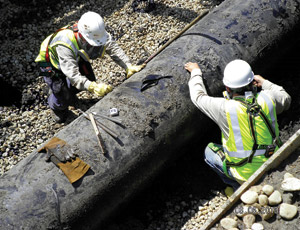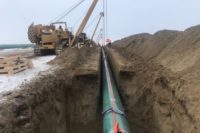On the heels of two high-profile oil- pipeline leaks in Michigan and Illinois and a high-pressure gas-pipeline explosion that killed at least four people and destroyed a neighborhood in San Bruno, Calif., U.S. Transportation Secretary Ray LaHood on Sept. 15 sent to Congress proposed legislation to beef up federal regulatory oversight and increase penalties for violations of pipeline safety rules.

The legislation the proposed bill would strengthen is scheduled for reauthorization in late September, according to Peter Lidiak, pipeline director for the American Petroleum Institute (API), an association that represents the U.S. petroleum and natural-gas industry.
“API is looking forward to working with the federal government to develop the final legislation,” says Lidiak, but he questions whether raising the maximum fine to $2.5 million from $1 million for pipeline operators who seriously violate rules will improve safety.
“Our data shows that excavator damage is the leading cause of pipeline accidents that result in damage or death,” he says. To help reduce excavator-related accidents, Lidiak says, API would like to see the bill give federal authorities more power to step in when a state doesn’t have strong enough requirements for pre-calling and marking of utilities before any kind of excavation begins.
API, the Association of Oil Pipelines (AOP) and the Common Ground Alliance (CGA)—a national organization that promotes shared responsibility and best practices to reduce damage to underground infrastructure—all favor adding provisions to override the current exemptions some states give municipal governments, state departments of transportation, some farmers and a few other groups to dig without first calling to have underground utilities marked.
API also questions whether the 40 extra inspectors the new bill would allow the federal Pipeline and Hazardous Materials Safety Administration to hire are needed. “PHMSA currently is authorized to have 135 inspectors and enforcement personnel. It now has only about 110. Why authorize 40 more if PHMSA hasn’t hired all the people it’s currently authorized to have?” says Lidiak. He notes that half of PHMSA’s budget comes from user fees paid by pipeline owners.
PHMSA did not return a call requesting comment for this story.
The bill’s proposed regulation of small collector lines, presently exempt from federal regulation, concerns the API and AOP. “All the small lines are regulated by other entities [such as] environmental protection agencies and the Coast Guard,” says AOP President Andy Black, “so there’s no need for them to also be regulated by the federal DOT.”
The vast network of pipes the regulations could affect covers up to 2.5 million miles, according to Carl Weimer, executive director of the watchdog organization Pipeline Safety Trust, which promotes fuel transportation safety through education and advocacy.
The network, says Weimer, includes about 200,000 miles of large-diameter liquid-petroleum transportation pipes, about 300,000 miles of large-diameter natural-gas transportation pipes and about two million miles of smaller diameter collector and distribution pipes. The smaller- pipes are currently exempt from federal regulation.
Although Weimer’s organization feels there’s “nothing bad” in the proposed legislation, it is only “a small step” toward the stronger regulation that’s needed.
“On average, there’s a significant pipeline incident every other day [somewhere in the country],” says Weimer. He says a “significant” incident involves damage over $50,000, an injury or a death.
Scott Berry, director of the municipal and utility construction division of the Associated General Contractors of America, says it’s still too early to tell whether the proposed legislation will have any effect on pipeline construction activity. “Its effect will depend on what the final bill looks like after it goes through changes in the congressional subcommittee and full committee markups,” Berry says.
No one expects Congress to take action on the proposal before the midterm elections in November.



Post a comment to this article
Report Abusive Comment